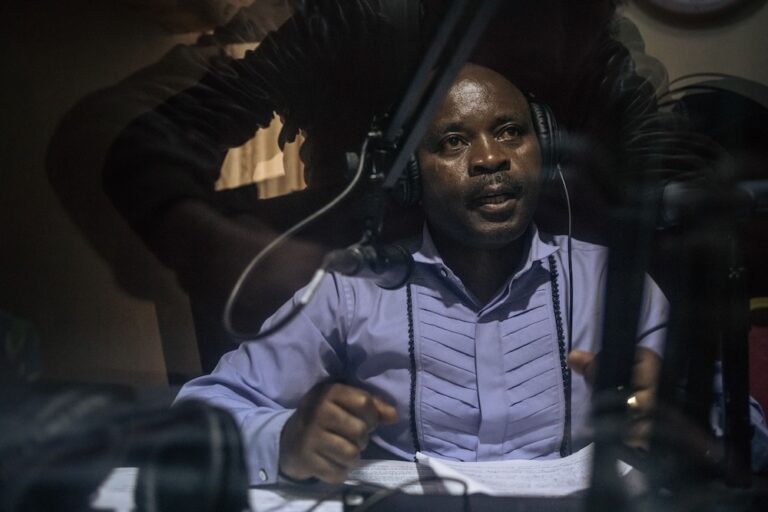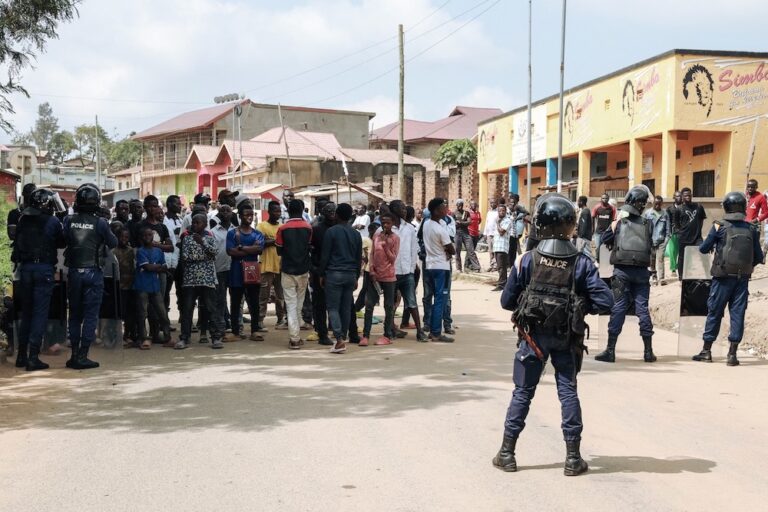(RSF/IFEX) – The following is a 24 January 2002 JED-RSF joint press release: Disappointed hopes mark first anniversary of Joseph Kabila’s appointment One year after Joseph Kabila’s appointment, which took place on 26 January 2001 in Kinshasa, the organisations Journaliste en danger and Reporters sans frontières wish to review the press-freedom situation in the Democratic […]
(RSF/IFEX) – The following is a 24 January 2002 JED-RSF joint press release:
Disappointed hopes mark first anniversary of Joseph Kabila’s appointment
One year after Joseph Kabila’s appointment, which took place on 26 January 2001 in Kinshasa, the organisations Journaliste en danger and Reporters sans frontières wish to review the press-freedom situation in the Democratic Republic of Congo. Since the Congolese head of state took power, twenty-seven journalists have been arrested by the security forces. Though this figure has dropped somewhat compared to during Laurent-Désiré Kabila’s years in power, it nonetheless remains one of the highest in Africa. In 2001, several journalists were assaulted or threatened, media outlets were searched, equipment was seized and newspaper vendors were arrested. Congolese journalists remain very threatened and exposed to possible reprisals from the government and the country’s many security services. When he was appointed, Joseph Kabila made a speech in which he pledged his support for human rights and democracy. He also went on a tour of Western capitals. Twelve months later, we unfortunately note that the president has not respected his commitments and has sent journalists to prison. He remains one of the world’s press freedom predators.
On several occasions in the spring of 2001, the country’s new governing team stated that the head of state had yet to assume full control of the country and that he did not have command of the security services. One year later, this argument is untenable. The government has been shuffled and the president is surrounded by a new group of individuals who are closer to him. According to many local observers, the various security services continue to act ruthlessly in an environment of total impunity, as was the case in the past. Joseph Kabila had also ordered the closure of all detention centres that were not under the State Prosecutor’s Office’s jurisdiction. Yet, twelve months later, most of the targeted jails are still operational and several journalists have been detained in their cells. These have included cells of the Special Police Services (Services spéciaux de la Police), Military Security (Détection des activités militaires anti-patrie, Demiap) and National Intelligence Agency (Agence nationale de renseignements, ANR).
The president’s entourage is sometimes directly responsible for a journalist’s arrest. As an example, on 14 June 2001, the ANR services arrested Joachim Diana Gikupa, publication director of the pro-government daily L’Avenir. The daily had published an article titled: “J. Kabila torpedoed by his entourage?” The article included an accompanying facsimile of a letter signed by Professor Théophile Bemba Fundu, President Joseph Kabila’s cabinet director. In the letter, simply addressed to “Mister Administrator”, the author asked the addressee to take all possible measures to prevent the holding of a political party leader’s press conference.
More recently, on 31 December 2001, Guy Kasongo Kilembwe and Vicky Bolingola, editor-in-chief and sub-editor of the satirical newspaper Pot-Pourri, respectively, were arrested in Kinshasa by Congolese National Police Special Services agents. They were charged with “threatening state security” and “insulting the head of state”. On the same day, Pot-Pourri published an article titled “Because of the current leaders’ incapacity and incompetence…hunger continues in 2002”. The newspaper wrote that “the holiday season is being marked by serious depression… All the while, Kabila II, the operetta general-major who was parachuted in as head of state, promises to orchestrate miracles in Katanga, just as Kabila I did.” The journalists were imprisoned for several days.
In spite of all these examples, one positive development can be noted this past year. The private radio and television stations RTKM and Canal Kin were returned to their rightful owners in October 2001. One year earlier, then minister of information Dominique Sakombi had decided to nationalise the private media outlets. However, the stations’ offices were ransacked by the state. RTKM and Canal Kin’s owners continue to demand that their seized equipment be returned and that their damaged equipment be repaired.


